
January 22
1248 (Exact Date Unknown) The first mention of gunpowder in Europe is in Roger Bacon's Epistola, De Secretis Operibus Artis et Naturae et de Nullitate Magiae. Note: The last ingredient is either in code or the result of garbled text in the original document:
We can, with saltpeter and other substances, compose artificially a fire that can be launched over long distances . . . . By only using a very small quantity of this material much light can be created accompanied by a horrible fracas. It is possible with it to destroy a town or an army . . . . In order to produce this artificial lightning and thunder it is necessary to take saltpeter, sulfur, and Luru Vopo Vir Can Utriet. (Temple) [See: Wunderwaffen: Hitler's Deception and the History of Rocketry.]
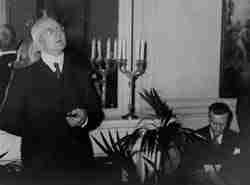
1877 Birth: Hjalmar Horace Greeley Schacht: Financial wizard of the Third Reich; President of the Reichsbank until 1939, and Minister without Portfolio until January 1943. Schacht will be acquitted at Nuremberg in 1946, despite protests by the Soviet judge. "His father had lived in the United States and named his son after the radical journalist, Horace Greeley . . . a prominent campaigner in America against slavery."
1901 Death: Queen Victoria:

The death of Queen Victoria on January 22, 1901, ends an era in which most of her British subjects know no other monarch. Her 63-year reign, the longest in British history, saw the growth of an empire on which the sun never set. Victoria restored dignity to the English monarchy and ensured its survival as a ceremonial political institution.
Born in 1819, she came to the throne after the death of her uncle, King William IV, in 1837. As a young woman ascending to the throne, her future husband described her "as one whose extreme obstinacy was constantly at war with her good nature." Her first prime minister, Lord Melbourne, became her close friend and adviser, and she succeeded in blocking his replacement by Tory leader Sir Robert Peel in 1839. Two years later, however, an election resulted in a Tory majority in the House of Commons, and Victoria was compelled to accept Peel as prime minister. Never again would she interfere so directly in the politics of democratic Britain.
In 1839, her first cousin Albert, a German prince, came to visit the English court at Windsor, and Victoria proposed to him five days after his arrival. Prince Albert accepted, and in February 1840 they were married. He soon became the dominant influence in her life and served as her private secretary. Among his greatest achievements as royal consort was his organization of the Great Exhibition of 1851, the first world's fair, in the Crystal Palace in London. He also steered her support away from the Whigs to the conservative Tories; she later was a vocal supporter of Benjamin Disraeli, leader of the Conservative Party.
Victoria and Albert built royal residences at Osborne House on the Isle of Wight and at Balmoral Castle in Scotland and became increasingly detached from London. They had nine children, including Victoria, later the empress of Germany, and the Prince of Wales, later King Edward VII. In 1861, Albert died, and Victoria's grief was such that she did not appear in public for three years. She never entirely got over the loss, and until the end of her life she had her maids nightly lay out Albert's clothes for the next day and in the morning replace the water in the basin in his room.
Disraeli coaxed her out of seclusion, and she was impressed by his efforts to strengthen and expand the British Empire. In 1876, he had her made "empress of India," a title which pleased her and made her a symbol of imperial unity. During the last few decades of her life, her popularity, which had suffered during her long public absence, increased greatly. She never embraced the social and technological advances of the 19th century but accepted the changes and worked hard to fulfill her ceremonial duties as head of state. When she died, she had 37 surviving great-grandchildren, and their marriages with other monarchies gave her the name the "grandmother of Europe." (History.com) [Note: Kaiser Wilhelm II of Germany was one of her grandchildren, and admired her greatly, and she died in his arms. The entanglement of the monarchy and nobility with Germany had some strange effects.]
1905 First Russian Revolution begins:
In Russia, the revolution of 1905 begins when czarist troops open fire on a peaceful group of workers marching to the Winter Palace in St. Petersburg to petition their grievances to Czar Nicholas II. Some 500 protestors were massacred on "Bloody Sunday," setting off months of protest and disorder throughout Russia.
By January 1905, discontent with the czar's regime permeated nearly all classes in Russia, especially after the crushing January 2 defeat of the Russian navy at Port Arthur during the Russo-Japanese War. In October 1905, Nicholas, embattled on all sides, was forced to grant basic civil liberties and a representative national body, which would be elected by narrowly limited suffrage. However, this Parliament, known as the Duma, was dissolved after it opposed Nicholas' authority, and the remnants of the revolutionary movement were brutally suppressed by czarist troops.
A decade later, czarist Russia was bogged down in the mire of World War I, prompting the Bolshevik-led Russian Revolution of 1917, which crushed the czar's opposition and proclaimed Russia the world's first Marxist state. (History.com)
1917 World War I: Various:
Gefreiter Adolf Hitler writes to Herr Josef Popp, his friend and former landlord in Munich:
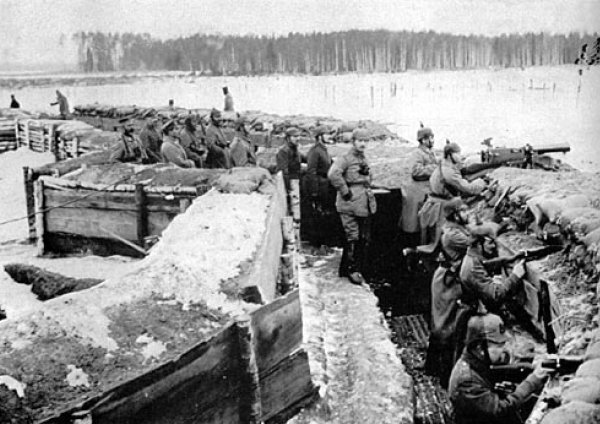
Now we are still in our old position, and harass the French and English. The weather is miserable. Often for days in water up to our knees under very heavy artillery fire. We are looking forward to a few days of relief. Hopefully, there will soon come a general offensive along the whole front. It can't go on like this forever.
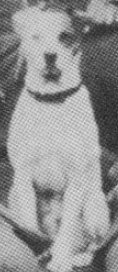
It was in January 1915 that I got hold of Foxl [Little Fox]. He was engaged in pursuing a rat that had jumped into our trench. He fought against me, and tried to bite me, but I didn't let go. With exemplary patience (he didn't understand a word of German), I gradually got him used to me. [For further details, Click here.]
League for Peace: President Wilson appears before Congress and outlines a plan for a league of peace, an organization designed to bring about a federation of peace-loving nations. Wilson asks for a "Peace without victory," a concept that is unappealing to both warring factions.

I have sought this opportunity to address you because I thought that I owed it to you, as the counsel associated with me in the final determination of our international obligations, to disclose to you without reserve the thought and purpose that have been taking form in my mind in regard to the duty of our Government in the days to come when it will be necessary to lay afresh and upon a new plan the foundations of peace among the nations. It is inconceivable that the people of the United States should play no part in that great enterprise. To take part in such a service will be the opportunity for which they have sought to prepare themselves by the very principles and purposes of their polity and the approved practices of their government ever since the days when they set up a new nation in the high and honorable hope that it might, in all that it was and did, show mankind the way to liberty. They cannot in honor withhold the service to which they are now about to be challenged. They do not wish to withhold it. But they owe it to themselves and to the other nations of the world to state the conditions under which they will feel free to render it. That service is nothing less than this, to add their authority and their power to the authority and force of other nations to guarantee peace and justice throughout the world. Such a settlement cannot now be long postponed. It is right that before it comes this Government should frankly formulate the conditions upon which it would feel justified in asking our people to approve its formal and solemn adherence to a League for Peace. I am here to attempt to state those conditions.
1924 James Ramsay Macdonald takes office as the first Labour Prime Minister in Britain.
1932 USA: New York Gov. Franklin D. Roosevelt announces his candidacy for the Democratic presidential nomination. (AP)
1937 Various:
Holocaust: German citizens are asked not to patronize Jewish doctors.
Soviet Union: Seventeen people go on trial in Moscow during Soviet leader Josef Stalin's Great Purge. (AP)
1940 Poland: Death toll of Poles executed by the Nazis reaches 15,000, and will accelerate.
1941 Various:

World War II: North Africa: British and Australians take Tobruk:
On this day, British and Commonwealth forces enter the port at Tobruk, in Libya, and tens of thousands of Italian occupiers are taken prisoner.
Italy declared war on Great Britain in June 1940. At that time, Gen. Rodolfo Graziani had almost 10 times the number of men in Libya than the British forces in Egypt under Gen. Archibald Wavell, who was commissioned to protect the North African approaches to the Suez Canal. A vast western desert stretched between the antagonists, who sat for months without confrontation. During that time, Italian forces passed into Egypt-but by that point Britain had reinforced its own numbers and decided to make a first strike. On December 9, Maj. Gen. Richard Nugent O'Connor launched a westward offensive from Mersa Matruh, in Egypt. Thirty thousand Brits warred against 80,000 Italians-but the British had the advantage of 275 tanks to the Italians' 120. Within three days, 40,000 Italian prisoners were taken. The battle marked the beginning of the end of the Italian occupation of North Africa.
General O'Connor then began a sweep of Italian positions in Libya. Under his direction in early January 1941, the British 7th Royal Tank Regiment drove westward from Bardia, which it had just taken from the Italians, with the intention of isolating Tobruk until the 6th Australian Division could aid in an assault. The attack on the coastal fortress of Tobruk was finally launched on the 21st and it fell the next day, yielding 30,000 Italian prisoners, 236 guns, and 87 tanks. The 7th Royal Tank Regiment was a remarkable unit, winning a quick series of battles in Libya despite a paucity of resources. (History.com)
[See: The Mediterranean Strategy.]
Holocaust: Jan 22-23 Anti-Semitic violence in Bucharest leaves 120 Jews dead in the streets. Men, women and children are hunted down by armed gangs. Some survivors flee to Palestine (See March 9). (THP)
Romania: The German Charge d'Affaires in Romania Dr. Neubacher, gives Horia Sima a solemn promise from both Hitler and Antonescu of complete impunity [sic] for Legionaries, and suggests participation in a new government, if resistance ends before noon on January 23. (THP)
Holocaust: In Bulgaria, the 'Law for the Defense of the Nation' gives Jews one month to leave all public posts, and forces almost all Jewish doctors, dentists and lawyers to give up their practices. A special tax is imposed on all Jewish homes, shops and other property, amounting to 25% of its value. (THP)
1943 Various:
The Secret Diary of Anti-Hitler Conspirator Ulrich von Hassel: (Berlin)
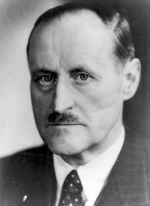
If the Josephs (generals) have been holding back their intervention until it should become obvious that the Corporal is leading us into the abyss, he has now complied with their wishes. The worst of it is that our confident predictions have proved true: that it will come too late and that any new regime will have to be a liquidation commission. It is probably not possible to say with certainty that the war is lost, but it is certain that it can no longer be won, and there is precious little hope of inducing the other side to make an acceptable peace now. The result is that the recognition that something must be done has gained ground among the Josephs, while at the same time so has the weakness of the external and internal front.
Holocaust: Call to Resistance in the Warsaw Ghetto:
During the past few weeks certain people have spread stories about letters that were said to have been received from Jews deported from Warsaw, who were said to be in labor camps near Minsk or Bobruisk. Jews in your masses, do not believe these tales. They are spread by Jews who are working for the Gestapo. The blood-stained murderers have a particular aim in doing this: to reassure the Jewish population in order that later the next deportation can be carried out without difficulty, with a minimum of force and without losses to the Germans. They want the Jews not to prepare hiding-places and not to resist. Jews, do not repeat these lying tales. Do not help the [Nazi] agents. The Gestapo's dastardly people will get their just desserts. Jews in your masses, the hour is near. You must be prepared to resist, not to give yourselves up like sheep to slaughter. Not even one Jew must go to the train. People who cannot resist actively must offer passive resistance, that is, by hiding. We have now received information from Lvov that the Jewish Police there itself carried out the deportation of 3,000 Jews. Such things will not happen again in Warsaw. The killing of Lejkin proves it. Now our slogan must be: Let everyone be ready to die like a man.
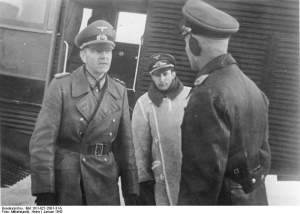
Stalingrad: The last phase of the assault on the German pocket begins. Paulus sends a signal to Hitler emphasizing his desperate shortage of food and ammunition and hinting at surrender, but Hitler refuses to countenance this. The airfield at Gumrak falls and forward elements of the Soviet Twenty-First Army make contact with Chuikov's sixty-second Army, which has been tying down German forces in Stalingrad itself. The Sixth Army is now split into two small pockets in the north and south of the city.
1944 World War II: Italy: The American VI Corps lands 50,000 troops at Anzio between the German Gustav Line to the south and Rome 33 miles to the north, but fails to break the stalemate. The assault troops consist of US 3rd Infantry Division, US Rangers, paratroops, and a British division.
1945 World War II: Various:
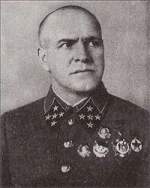
Eastern Front: Gneizo is taken by Marshal Zhukov in his drive for Poznan. To the north, Insterburg, Allenstein and Deutsch Eylau are all taken by the Soviets. [See: The Last Days of the Third Reich.]
Operation Hannibal: German Grand Admiral Karl Dönitz ordered the beginning of Operation Hannibal, which became one of the largest emergency evacuations by sea in history, with over 1 million people transferred over 15 weeks. [For further information, click here]

France: The US First Army attacks along the front between Houffalize and St. Vith. The British Second Army takes St. Joost and other towns near Sittard.
Burma Road: The land route to China, the Ledo road across Burma from India to China, is reopened.
1946 Nuremberg Tribunal: Day 40: Continuation of M. Delpech's Presentation of the case regarding actions in Belgium and Luxembourg. M. Gerthoffer's Presentation of the case regarding economic pillage of France. M. Delpech
Coming back to what was said in the course of the general considerations on economic pillage and on the behavior of the Germans in Norway and Denmark and in Holland, I have been able to show that in all places the determination to economic domination of National Socialism had manifested itself. The methods were the same everywhere, at least in their broad outlines. Therefore in immediate response to the wish expressed yesterday by the Tribunal and to fulfill the mission entrusted to the French Prosecution by the Belgian Government to plead its case before your high jurisdiction, I shall confine myself to the main outlines of the development, and I shall take the liberty of referring to the details of the German seizure of Belgian production, to the text of the report submitted to the Tribunal, and to the numerous documents which are quoted in our document book.
I have had the honor of calling your attention to the existence of the black market in Belgium, its organization by the occupation troops, and their final decision to suppress -this black market. One may, with respect to this, conclude, as has already been indicated in the course of the general observations, that in spite of their claims it was not in order to avoid inflation in Belgium that the German authorities led a campaign against the black market.
The day the Germans decided to suppress the black market, they loudly proclaimed their anxiety to spare the Belgian economy and the Belgian population the very serious consequences of the threatening inflation. In reality, the German authorities intervened against the black market in order to prevent its ever growing extension from reaching the point where it would absorb all the available merchandise and completely strangle the official market. In a word, the survival of the official market with its lower prices was finally much more profitable for the army of occupation. [For the full text of today's proceedings, Click here.]
1950 Israel: The Knesset approves a resolution proclaiming Jerusalem the capital of Israel. (AP)
1970 Rudolf 'Rudi' Wolters, Speer's friend and archivist, writes to Albert Speer concerning entries Wolter's had altered in the Chronik, a record of Speer's activities in Hitler's government [See February 13, 1970]:
Couldn't reply sooner to your letter from Selva as Marion and I spent all the time searching for the Chronik original. Without further ado: it has vanished without a trace; it's gone; no longer here—it has ceased to exist. Well, I think it's just as well. Because if it did still exist, then, yes, one would have to hand it in as is. One certainly couldn't correct it again, for if that were discovered, it would be even more embarrassing . . . . Having exercised my author's privilege of selection and editing in the first place, I had no hesitation to do so on the second occasion. But as a copy of the original (of the year 1943) apparently exists in London, I certainly would not wish to do it a third time. So, as far as I am concerned, this is the end of this matter; I hope it is the same for you. If there are any complications, just blame it all on me—or Marion if you like; as an artist, meticulous organization of documents, understandably enough, is not her 'forte'. (Sereny)
1982 Cold War: Reagan links arms talks with Soviets to oppression in Poland:
In a revival of the diplomacy "linkages" that were made famous by Henry Kissinger during the Nixon years, the administration of President Ronald Reagan announces that further progress on arms talks will be linked to a reduction of Soviet oppression in Poland. The U.S. ploy was but one more piece of the increasingly complex jigsaw puzzle of nuclear arms reduction. [For further information, click here]
Edited by Levi Bookin (Copy editor)
levi.bookin@gmail.com



Click to join 3rdReichStudies

FAIR USE NOTICE: This site may contain copyrighted material the use of which has not always been specifically authorized by the copyright owner. We are making such material available in our efforts to advance understanding of historical, political, human rights, economic, democracy, scientific, environmental, and social justice issues, etc. We believe this constitutes a 'fair use' of any such copyrighted material as provided for in section 107 of the US Copyright Law. In accordance with Title 17 U.S.C. Section 107, the material on this site is distributed without profit to those who have expressed a prior interest in receiving the included information for research and educational purposes. If you wish to use copyrighted material from this site for purposes of your own that go beyond 'fair use', you must obtain permission from the copyright owner.
Please note that the list-owner and the moderators are not responsible for, and do not necessarily approve of, the random ads placed on our pages by our web server. They are, unfortunately, the price one pays for a 'free' website.